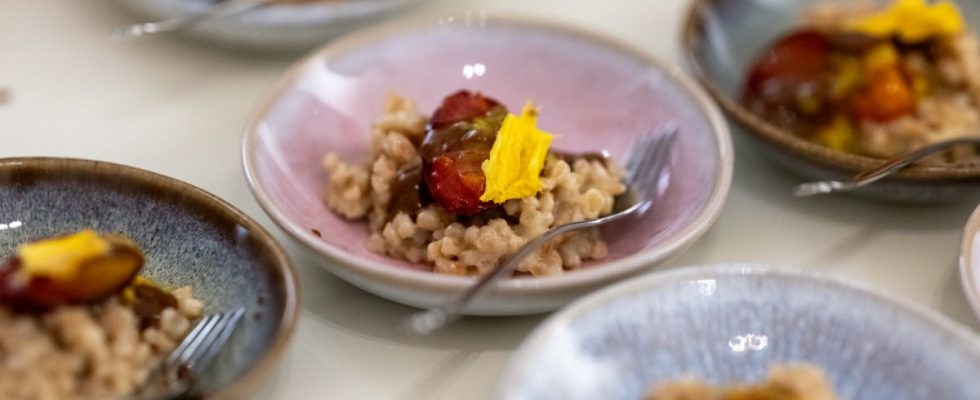Golden millet, pearl emmer or quinoa tempeh are rarely on the menu in most Munich households. But they are the focus of the three-course menu under the motto “Climate-friendly feasting and slamming” in the One World House. At the event as part of the Munich Climate Autumn, the chef Vincent Fricke wants to show with his dinner what a climate-friendly menu can taste like.
Locally grown black cabbage, potato cubes on crispy fried beetroot slices, plus pumpkin and emmer, one of the oldest cultivated grains, form the first course. As calculations by the University of Greifswald show, which will be served as an accompaniment to the menu that evening, the subsequent costs of this starter are only around a third of those of common antipasti. When calculating the price of many foods, “the costs of environmental impact are often not taken into account,” says Amelie Michalke from the University of Greifwald.
Instead of meat, Fricke serves quinoa tempeh with sweet potato puree with a subtle hint of ginger and golden millet as the main course. The follow-up costs, we learn, are ten cents per meal. A classic schnitzel with fries and ketchup would cost around 89 cents. And the plant components are also beneficial for health: The tempeh, which is based on soybeans and noble mold, “has a positive effect on the intestinal flora,” says Fricke.
The dessert appears conventional on the menu, but surprises on the plate. Behind “rice pudding with chocolate sauce and fruit” is once again one of the oldest types of grain: pearl emmer with oat milk. Although palm oil and cocoa are involved in this dessert, there are also “fairly produced versions” of these foods, says Fricke. Compared to desserts such as rice pudding with raspberry sauce, the vegan dish incurs around 75 percent of the follow-up costs.
There’s slamming between the courses: Amelie Michalke addresses the topic of environmental pollution in the context of the techno hit “How much is the fish?” the band Scooters and explains how the production conditions affect: from emissions to climate change to extreme weather situations and the resulting costs for society. “We no longer have time to rest,” says the scientist. Drawing attention to this problem is the shared concern of Tollwood, the University of Greifswald and the other organizers of the climate-friendly dinner.

